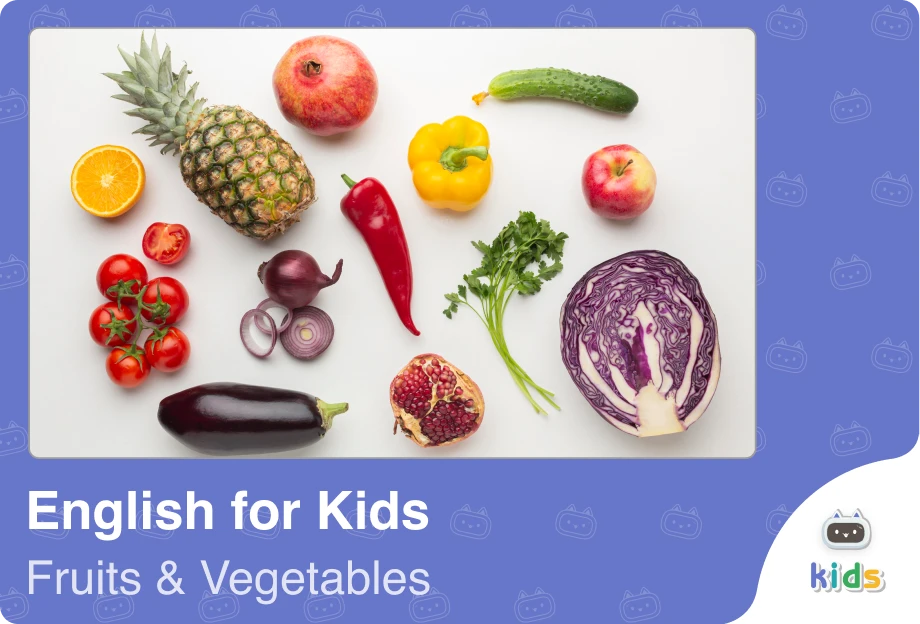Fruits and vegetables are an important part of our daily lives. We see them in our meals, at the grocery store, and even in books and games. For kids learning English, starting with the names of common fruits and vegetables is a simple and effective way to build vocabulary. These words are easy to remember because they are familiar and used often in everyday conversations. By learning how to say and use fruit and vegetable names in sentences, we can improve our speaking, reading, and listening skills. In this blog post, you’ll find useful vocabulary and example sentences to learn English in a fun and practical way.
Learn English with EnglishCentral Kids
Would you like to take your child’s learning journey further? EnglishCentral Kids provides a fun and successful education with 25 minute one-on-one lessons for all ages and levels, along with lesson reports afterwards. There are fun and educational video lessons for your child to explore, and an AI tutor MiMi that will help your child with their English learning journey. Quizzes, interactive activities and entertaining vocabulary learning tools are gathered all on one platform and tailored according to your child’s level and needs.
Sign up to EnglishCentral Kids today for your child, keep learning and practicing!
List of English Fruits
Fruits are an important part of a healthy diet, and learning their names in English is a fun and useful way to build your vocabulary. Knowing the names of common fruits will help you in daily conversations. In this list, you’ll find some of the most popular and delicious fruits that are enjoyed around the world.
| Apple | Banana |
| Watermelon | Pear |
| Peach | Grapes |
| Orange | Strawberry |
| Pineapple | Kiwi |
| Cherry | Blueberry |
| Blackberry | Apricot |
| Pomegranate | Plum |
| Melon | Lemon |
| Coconut | Raspberry |
| Mango | Grapefruit |
| Tangerine | Fig |
Example Sentences with Fruits
It’s important to reinforce the vocabulary that we learned with example sentences. Here are some simple and useful example sentences using fruit names to help you practice.
– I love eating juicy apples every morning for breakfast.
– The banana is yellow and very sweet.
– We are going to have watermelon at the picnic.
– My sister’s favorite fruit is a pear.
– For dessert, I had a bowl of peach slices.
– Grapes are the perfect snack to take to school.
– I ate oranges for breakfast.
– I put some strawberry slices on top of the cake.
– We made a big fruit salad with lots of pineapple.
– The kiwi is green and delicious.
– Coconuts are sweet and juicy.
– I don’t like lemons because they’re sour.
– Mangoes are great for smoothies.
– Tangerines are sour and sweet.
– Figs are my favorite fruit.
– My mom bought grapefruit from the store.
List of English Vegetables
Vegetables are a big part of everyday life when you’re cooking at home or shopping at the market. Learning their names in English helps you talk about food, meals, and healthy habits more easily. Here is a list of commonly used vegetables that you’ll often see in recipes, menus, and grocery stores.
| Carrot | Potato |
| Tomato | Cucumber |
| Broccoli | Onion |
| Spinach | Garlic |
| Lettuce | Cauliflower |
| Peas | Pepper |
| Eggplant | Zucchini |
| Corn | Cabbage |
| Mushroom | Radish |
| Leek | Green Beans |
| Sweet Potato | Asparagus |
Example Sentences with Vegetables
Let’s look at some example sentences about vegetables to practice their use in conversations.
– I put carrots in my salad for some extra crunch.
– We boiled potatoes to make mashed potatoes.
– Tomatoes are great in sandwiches and salads.
– I love adding slices of cucumber to my water.
– We cooked some broccoli for dinner.
– Onions make the soup very tasty.
– Spinach is very healthy.
– I like to add some garlic to my pasta sauce.
– Lettuce is the main ingredient in my favorite salad.
– Cauliflower can be roasted for a tasty dish.
– Peas are perfect for mixing into rice.
– Eggplant is delicious when baked.
– I love making fried zucchini.
– We grew corn in our garden and it tastes amazing.
– I don’t like eating asparagus.
– Leeks are my dad’s favorite vegetable.
– My mom made green beans for dinner.
– My sister loves sweet potatoes because they’re delicious.
Frequently Asked Questions About English for Kids – Fruits & Vegetables
Why should kids learn fruit and vegetable names in English?
These fruit and vegetable names are everyday words that children already see and use in real life. Learning them in English helps kids connect language to real-world objects, making vocabulary easier to understand and remember.
What are some fun ways to practice fruit and vegetable vocabulary?
Matching games, drawing the fruits and veggies, role-playing in a pretend shop, or singing songs that include the vocabulary are great ways to keep learning fun.
Is fruit and vegetable vocabulary useful in everyday conversation?
Absolutely! Fruit and vegetable names often come up when talking about meals, shopping, or health so kids can use them regularly.
How do I know if my child is making progress in learning vocabulary?
If your child can recognize, name, and use the words correctly in simple sentences or conversations, that’s great progress! Look for confidence and curiosity, they’re key signs of learning.
You can access everything your child needs to learn English on a single platform! With 25-minute live lessons guided by teachers specialized in child education, entertaining and instructive interactive videos designed for child development, vocabulary learning tools, the AI Tutor MiMi, quizzes, and interactive activities, EnglishCentral Kids offers a personalized and quality education plan tailored to your child’s needs at affordable prices. How about registering for EnglishCentral Kids now and starting your child’s English learning journey?











